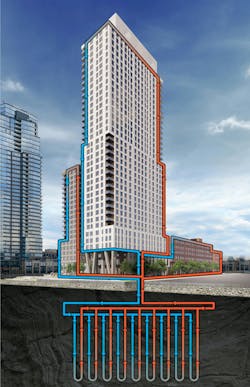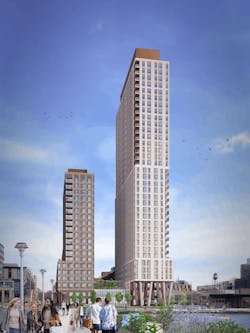Lendlease secures grants for New York’s largest geothermal residential building
Lendlease and joint venture partner Aware Super, one of Australia’s largest superannuation funds, today announced the acquisition of $4 million in support from the New York State Energy Research and Development Authority (NYSERDA) to build a geoexchange system at 1 Java Street in Brooklyn. Once completed, the all-electric property will be the largest residential project in New York State to use a geothermal heat exchange system, according to NYSERDA.
Situated on a 2.6-acre site, 1 Java Street will comprise five interconnected buildings, including 37-story and 20-story towers. Based on square footage, building height, the 834 residential units and number of boreholes, the geothermal system will be the largest multifamily project in New York State. It is believed to be the largest high-rise residential geoexchange system in the country.
The $4 million in funding was obtained through a competitive grant from NYSERDA’s Community Heat Pump Systems Pilot Program. The project—which has received support by local elected officials and the North Brooklyn Neighbors community planning organization—included a feasibility analysis, design work and the currently-underway installation of a community heat pump system, also known as a thermal energy network.
“1 Java Street presents us with the opportunity to establish a pioneering model for geothermal energy, aligning with New York’s ambitious climate goals, as well as our global targets of absolute zero carbon by 2040,” said Scott Walsh, Project Director, New York Development for Lendlease. “Our decision to use geothermal was driven not only by the environmental benefits and cost savings, but also enhanced marketability upon completion.”
NYSERDA Director of Clean Heating and Cooling Donovan Gordon said: “Community thermal networks are an important step in scaling building electrification and helping more residents benefit from clean energy infrastructure that can lead to long-term energy savings. Our support for this innovative project using the latest in clean heating and cooling technology will help us meet New York State’s climate and clean energy goals while reducing emissions in Brooklyn.”
Once completed, the geothermal system at 1 Java Street will reduce annual carbon emissions from heating and cooling by 53% compared with typical residential systems. As an all-electric building, 1 Java Street will also avoid carbon emissions related to the use of natural gas.
The on-site geothermal and all-electric systems of 1 Java Street ensure the project will meet or exceed Local Law 97, New York’s decarbonization legislation, and align with Mission Zero, Lendlease’s industry-leading initiative to reach absolute zero carbon—extending to its supply chain—by 2040. 1 Java Street will also target a range of sustainability initiatives including LEED Gold, Fitwel and Waterfront Edge Design Guidelines certification.
Slated for completion in late 2025, 1 Java Street is the sixth project developed and operated as part of the Aware Super and Lendlease joint venture Americas multifamily portfolio, which achieved net zero carbon in 2021. The joint venture’s stabilized assets were also recently recognized by GRESB as Regional Sector Leader for superior ESG performance.
“We’re excited to celebrate the geothermal project that 1 Java Street is delivering for our property portfolio," said Alek Misev, Aware Super's Senior Portfolio Manager. "The sustainable benefits to be generated from New York City’s largest residential geothermal project will not only demand less energy from the grid at peak times, but also reduce carbon emissions, both of which are expected to uplift the value of this asset.”
Thirty percent of 1 Java Street's residential units have been designated as affordable housing under the Affordable New York Housing Program. In addition, over 13,000 square feet of space at the ground floor will be activated with retail. The property will also encompass a reimagined, 18,000-square-foot public waterfront esplanade that connects to the India Street Pier, which is served by the East River Ferry.
Overview of 1 Java Street’s Geothermal System
The geothermal system at 1 Java Street is a vertical closed loop system with underground pipes that circulate a water solution to be heated or cooled by the earth; a heat pump will utilize that temperature differential to help heat or cool the building, reducing the need for utility power. In the winter, when the underground temperature exceeds the surface air temperature, the water solution is used to transfer heat from the ground to building interiors. The process is reversed in the summer, when heat from the building is released underground using the same system.
1 Java Street benefits from its 2.6-acre, full-block location, allowing for the drilling of 320 boreholes. As a closed loop system requires no future access or maintenance, 1 Java Street’s borefield is located beneath the building. The site’s underground geology, which is largely composed of bedrock, provides an ideal medium for efficient thermal exchange.
Compared to conventional technologies, closed loop geothermal systems are more energy efficient and emit fewer carbon emissions. The geothermal system designed for 1 Java Street will account for 1,050 fewer metric tons of CO2 equivalent emissions than if the building used a traditional boiler/tower system. This is equivalent to planting over 5,200 trees.
The geothermal system will provide all the space heating, water heating and cooling for the project. In addition, 1 Java Street will be fully electric, with all cooking, clothes drying and other functions performed by electric appliances and building systems. This means the property will comply with New York City’s Local Law 154 – the city’s legislation that mandates most new buildings over seven stories be fully electric by 2027.
More about the 1 Java Street development by Lendlease
Developed by Lendlease, 1 Java Street is a sustainable, urban regeneration development along the Greenpoint waterfront in Brooklyn, New York. Scheduled for completion in late 2025, the project will comprise 834 rental units, 30% of which have been designated as affordable housing under the Affordable New York Housing Program. The all-electric property will utilize a vertical closed-loop geoexchange system, making it the largest geothermal residential development in New York State.
Designed by Marvel, 1 Java Street will be comprised of five interconnected buildings, including a 37-story and a 20-story tower. The property will feature nearly 13,000 square feet of retail space, as well as an 18,000-square-foot public waterfront esplanade connecting to the India Street Pier, which is served by the East River Ferry. Targeting LEED Gold certification and designed to meet or exceed Local Law 154, New York City’s legislation that mandates new construction to be all-electric, and Local Law 97, New York City’s decarbonization legislation, 1 Java Street aligns with Mission Zero, Lendlease’s industry-leading initiative to reach absolute zero carbon by 2040.

